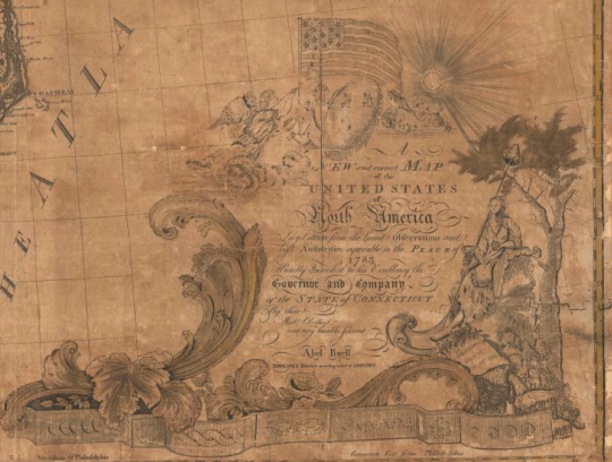By Nancy Finlay for Your Public Media
Abel Buell was by all accounts a colorful character, a typical Yankee jack-of-all-trades and entrepreneur. John Warner Barber, in the 1830s, described him as “an uncommonly ingenious mechanic.” In the 1950s, Buell’s biographer Lawrence Wroth described him as “a restless, unstable, inventive genius.”
Buell was born in Clinton, Connecticut, in 1743. He was apprenticed to a silversmith and later practiced that trade with some success. At an early age, however, he got in trouble with the law, using his engraving skills to counterfeit the colonial currency. Because of his youth, he got off with what was considered a light sentence in those days: he had one ear cropped and he was branded on the forehead.
Clinton-born Engraver Puts Himself on the Map
Buell moved to New Haven, where he began experimenting with the founding of printing types and the minting of coins, this time legally. He also began engraving copper plates for printing. Among his early engravings are a chart of Saybrook Bar at the entrance to the Connecticut River and a diploma for Yale College. It was there, in 1784, that he published his New and Correct Map of the United States, the first map of the new United States to be printed and published in America and one of the first to show the flag of the new nation.
Like most of Buell’s other ventures, his New and Correct Map was not a financial success. Buell died in a New Haven almshouse in 1822. The Connecticut Historical Society has one of only seven surviving copies of his groundbreaking map, as well as other examples of his engraving.
The Connecticut Historical Society received a major grant from Connecticut Humanities to organize, catalog, and digitize about 800 maps from the CHS collection. These maps will be added to eMuseum, the CHS online museum catalog, and to Connecticut History Illustrated, a collaborative online digital library of primary and secondary resources relating to Connecticut History.
Nancy Finlay, formerly the Curator of Graphics at the Connecticut Historical Society, is the editor of Picturing Victorian America: Prints by the Kellogg Brothers of Hartford, Connecticut, 1830-1880.
© Connecticut Public Broadcasting Network and Connecticut Historical Society. All rights reserved. This article originally appeared on Your Public Media









